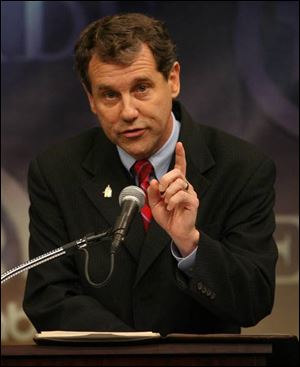
Brown fosters image of friend to 'the little guy'
10/22/2006
Rep. Sherrod Brown calls for a reduction in medical insurance costs and revising trade deals to assist American workers.
WASHINGTON - Every fighter has a story - crime-fighters, prizefighters, even self-styled fighters for the middle class.
Sherrod Brown's story is missing something. Or maybe it's backwards. Here's the rub:
Ask Mr. Brown, the Democratic congressman riding a blue-collar steam engine through Ohio's U.S. Senate race this fall, who taught him about social justice. I don't know, he says. My dad was good to his patients. My mom said respect your elders, whatever race or class. They could have joined a country club but didn't.
Ask Mr. Brown, who wears a miner's caged canary where most politicians pin an American flag, when he first toured a coal shaft or a steel plant. I don't know, he says. After I got into politics, probably. I used to lunch with steelworkers on legislative breaks.
But ask Democrats or Republicans what occupies Mr. Brown in the U.S. House, what he'd focus on in the Senate, and they all say the same thing: International trade. Health care. Working family issues.
"Everything that he does," says U.S. Rep. Frank Pallone (D., N.J.), one of Mr. Brown's closest political allies, "is always out of concern for the little guy and fighting the bad corporate interests."
Mr. Brown has pounded that image throughout his high-profile challenge to Republican U.S. Sen. Mike DeWine this fall. He preaches reducing medical insurance costs and revising trade deals to help American workers. He calls the race a choice between special interests and the middle class.
Republicans respond by calling Mr. Brown too liberal, too combative, and not effective enough to make a dent in the Senate.
But where did this Sherrod Brown come from? Mr. Brown, 53, was the son of a doctor in Mansfield, a lefty high school ballplayer who majored in Russian studies at Yale.
He launched his political career before graduation, landed a seat in the Ohio House, and has since won every election but one - his 1990 bid for a third term as secretary of state, when he lost to a Republican named Bob Taft.
Mr. Brown never worked a lunch-pail job or carried a union card (the arguable highlight of his two-year stint out of politics: a freelance piece on post-communist Polish elections for The Blade).
But he trolled factory parking lots at 4 a.m. during his first run for Congress in 1992, shaking hands and listening.
He remembered his father charging patients less than he could have and his mother's orders to call older people "Mrs. Jones" or "Mr. Smith" instead of their first names.
Brushing up to teach Sunday school after college, he spent a lot of time with the Beatitudes - blessed are the meek, the poor, the peacemakers. Running for office, he forged deep ties with organized labor. Somewhere along the way, he internalized it all.
"In most countries of the world through most of history," Mr. Brown writes in his book Congress from the Inside, "governments were controlled by the wealthiest people in the country for the benefit of the wealthiest people in the country the American government, at its best, took the side of the less powerful."
Colleagues say that philosophy drives Mr. Brown's work in the House. Rep. Lois Capps (D., Calif.), a registered nurse, calls him "a champion of concerns for access to health care."
Rep. Bernie Sanders (I., Vt.), who is also running for Senate this year, credits Mr. Brown for leading fights against deals such as the North American Free Trade Agreement and the more recent Central American Free Trade Agreement.
Thanks to Mr. Brown, he said, "The case has been made to the American people that outsourcing has been devastating."
Republican Rep. Steven LaTourette of Lake County in northeast Ohio calls Mr. Brown a Democratic leader on both issues. But echoing GOP claims that Mr. Brown doesn't work across party lines, he adds, "Sherrod's a very partisan guy."
Mr. Brown says he ramped up his rhetoric in 2004, when he believed President Bush was damaging the nation with "his economic policy, his Iraq policy, his divide-America policy."
"I wanted to sharpen the debate," he said. "I don't run as Republican-lite. The Democrats stand for this, the Republicans stand for that - very sharp differences. People can choose."
Contact Jim Tankersley at: jtankersley@theblade.com or 419-724-6134.